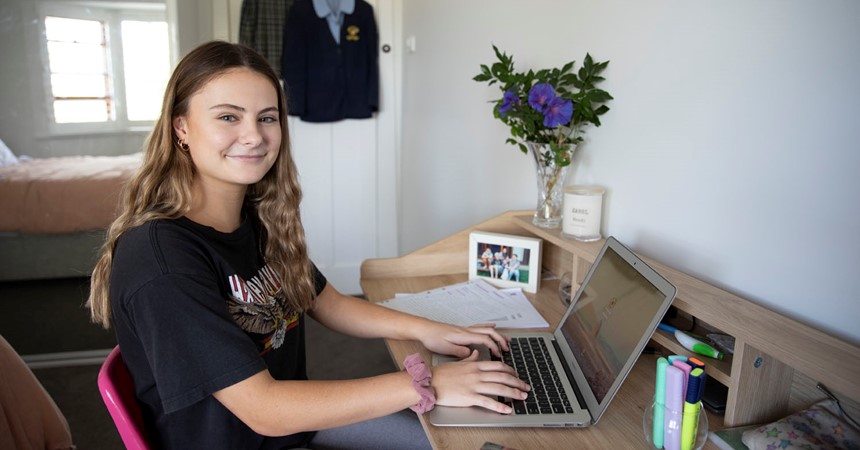“I’ve been quite concerned that having to complete my school work from home was not allowing me to perform to the best of my abilities,” the St Francis Xavier’s College (SFX), Hamilton pupil said.
“Studying from home has limited my face-to-face communications with my teachers, which is my preferred method of learning.”
Although teachers had been consistently organising Zoom video meetings, Mackenzie said maintaining concentration without the structure of the classroom had its challenges. “Zoom meetings don’t go for the whole lesson, so you’ve got to be self-motivated since there is nobody watching over you.”
Mackenzie’s Year 12 classmate, Jessica Chagorski, agrees it is harder to stay motivated at home. “I do find it difficult to stay focused on my studies in the comfort of my own home,” she said. “I’m not performing to my full capabilities at home and am worried this will negatively affect my final HSC marks.”
Despite the obvious challenges, Mackenize said there had been some benefits to working from home. “Home learning has enabled me to study at a pace that suits me,” she said. “I’ve also appreciated the flexibility the teachers have shown in supporting us. They are always quick to respond when I ask a question.”
In recognition of these challenges and the crucial role the HSC plays in future life success, Diocese of Maitland-Newcastle director of Catholic Schools, Gerard Mowbray, said the resumption of face-to-face learning across all 57 schools in the Diocese would involve “a staggered approach to the return of on-campus learning”, with an emphasis placed on particular year groups.
“We will be placing concerted emphasis on Year 11 and Year 12 students' face-to-face learning, as they prepare to sit for their Higher School Certificate,” he said.
Mr Mowbray said the NSW Education Standards Authority is committed to delivering the HSC but is aware it must be very flexible with assessments, major works, exams and work placements.
“I can say we aren’t going to lose this year,” Mr Mowbray said. “We will ensure Year 12 finishes 2020 with a credential and an effective pathway to proceed with work and study next year.”
Premier Gladys Berejiklian said while students would start returning to the classroom from 11 May, it would not be “school under normal circumstances”.
“Initially, it will just be a day a week and then progressively two days, and then we hope by the end of Term 2 we'll be in a position to have students going back to school in a full-time capacity by Term 3,” she said.
Parents could expect an increased emphasis on safety by way of “extra cleaning, extra sanitiser, extra health provisions, including forehead thermometers and also extra health equipment in our sick bays”, Ms Berejiklian said.
Aside from the focus on Years 11 and 12, Mr Mowbray said it was also important younger age groups, such as Kindergarten, remained familiar with face-to-face learning and for this reason they would also be a priority when on-campus learning resumes.
Lauren Payne’s daughter Millie attends Kindergarten at St Joseph’s, Merewether, and she has mixed feelings about the Premier’s announcement.
“They have put so much effort into establishing online learning. I think they should have all of Term 2 off and bring them back for Term 3 when hopefully the health situation will be much clearer,” she said.
Ms Payne said safety was still a significant concern for her and she intended to keep Millie home for a few more weeks after 11 May to assess the situation before sending her back.
Mr Mowbray said the gradual shift back to a school based program would be completely dictated by the expert medical advice. “We will commence a transition to school based learning from week three (Term 2) onwards but we are not going to rush anything,” he said.
“Parents can rest assured we will always make educational decisions based on the best expert medical advice provided by the government.
“Our goal is for all students and staff to return to on-campus learning in a measured and timely manner, but only when it is safe to do so.”



























































































